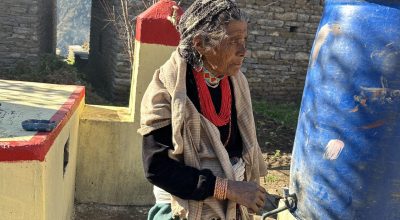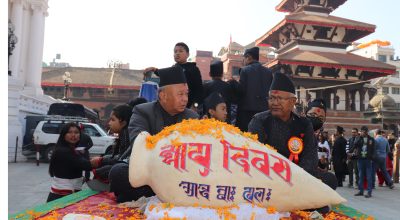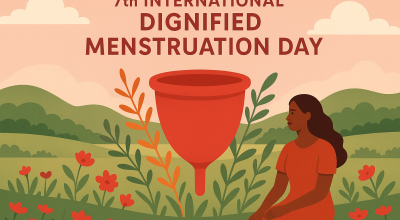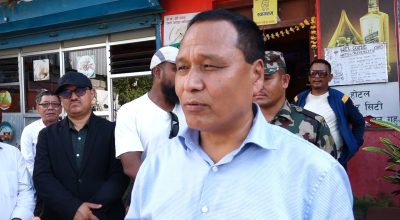
LAMAHI – Rapti Rural Municipality, Gadhawa Rural Municipality and Rajpur Rural Municipality of Dang district under the Middle Rapti Watershed Area have imposed a ban on destructive fishing practices in a bid to conserve the aquatic biodiversity.
The rural municipalities have said that they have imposed a ban on fishing by using electricity, explosive devices and poisoning.

The people’s representatives said so while speaking at a program organized by Nepal Forum of Environmental Journalists (NEFEJ) at Lamahi of Dang district.
Speaking at the program, Rapti Rural Municipality Vice-Chairperson Jagadamba Kumari Chaudhary said that the destructive fishing practices have been completely brought control.
“We have curbed the fishing by using electricity, explosive devices and poisoning, in coordination with police personnel,” she said, adding, “We have also endorsed an Act related to conserving aquatic biodiversity and we are working to implement it.”
She said that the rural municipality has already allocated Rs 200,000 in the current fiscal year to raise awareness among the fishing communities to conserve the aquatic animals.
Bidhya Sharan Chaudhary, Chairman of Ward-7, said that hoarding boards have been put up to spread awareness against the destructive fishing practices. He further said that some people were arrested for fishing by using destructive methods and slapped a fine of Rs 15,000 each. Chaudhary said that they also confiscated such fishing equipment and handed over to the district administration.

Speaking at the program, Rajpur Rural Municipality Chairman Lokraj KC informed that the Act related to conserving aquatic animals and aquatic bio diversity was endorsed from the village assembly.
Saying that it would destroy the habitat of aquatic animals while extracting the riverbed materials, he said the Rajpur Rural Municipality has started carrying out Initial Environmental Examination (IEE) while extracting the riverbed materials.
He said that the rural municipality is planning to construct a pond to collect rainwater by allocating Rs 2.5 million after the water sources started drying up.
Similarly, Gadhawa Rural Municipality Chairman Sahajram Yadav said that fishing community, Nepal Police and Rural Municipality have been working jointly to conserve the fish and aquatic animals. “I have seen some people fishing by using destructive methods at the direction of some powerful persons of the rural municipality,” he said. “When we inform the police, they help those persons to flee the village,” Yadav said. He further said that the police have started arresting the people who use destructive methods to kill the fish after the rural municipality showed them the recently formulated Act.

Speaking at the program, Baikha Machha (fish) group Chairman Poteshwor Chaudhary said that though the practice of fishing by using destructive method has been banned in Middle Rapti, people have not abandoned such practices while fishing in Raniyapur and Balarampur, among other villages of Lamahi. He said that the Lamahi Municipality should also form a fishing community like other rural municipalities to conserve the aquatic animals.
“It will not be sufficient to conserve the aquatic animals by forming some fishing communities, urging all the local level and people to join hands together to conserve them,” he said.
Also speaking at the same program, Bimala Chaudhary, a member of Raina Machha (fish) group, said that the fishing by using destructive methods has decreased this year in comparison to last year.
Kabita Chaudhary of Rapti Rural Municipality Ward-6 said that they have been collecting one rupees every day from all the members of the group to conserve the fish.

On the occasion, Officiating Chief at the Ward Police Office Lamahi Puran Malla said that they have arrested some people for using destructing methods to kill the fish.
Earlier in 2018, eight persons were detained while they were killing fish by using electricity and later police handed them the over to the District Administration Office. They were taken action under the Aquatic Animal Protect Act 2017.
During the program, province assembly member of Province 5, Rewati Raman Sharma said that awareness should be raised among the people to conserve the aquatic animals and aquatic biodiversity.
He said that the province government has adopted ‘One Rural Municipality, One Pond’ for the aquatic animals and aquatic biodiversity. Sharma further said that ponds have been dug up in many rural municipalities and the budget has already been allocated.
He said that the province government has started constructing natural dam for the conservation of environment.

Saying that the law is essential for the conservation of aquatic biodiversity, Sharma said that coordination among all the people and concerned authorities is necessary to formulate the law.
Also the member of Public Accounts Committee, Sharma said that during his visit to the area he found almost all the crusher factory being operated against the standard, and he has mentioned this thing in the report also.
Members of fishing community, locals, people’s representatives of Rajpur, Gadhawa and Rapti Rural Municipality were present in the program. Six-point commitment was made during the program.
Commitments :
- Local level will organize awareness programs for the effective implementation of Aquatic Animal Protection Act
- Informative hoarding boards will be put up in the areas where people use destructive methods to kill fish
- Groups will be formed in necessary places for the conservation of fish
- One pond will be dug up in one ward in Rapti Rural Municipality
- Province government will organize programs for the conservation of aquatic animals by allocating the budget
- To give continuation to the earlier commitments
















